★½
“V.I. Warshitski.”
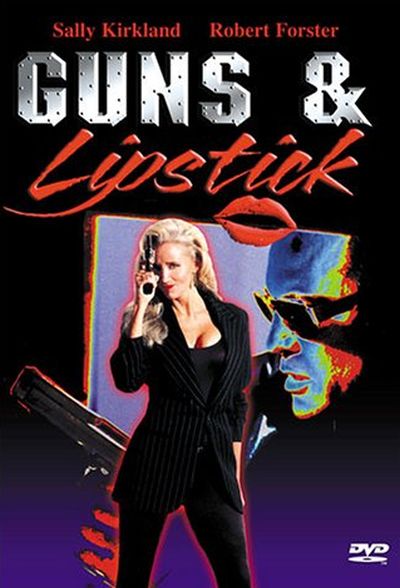 I’m not saying this was a film made, The Producers-style, as a tax write-off. But if a movie was made for that purpose, it would probably look as slapdash and amateurish as this. I’ll just give you one example. Near the end, the heroine is seen by a corrupt cop and he gives chase. It starts in broad daylight, up in the mountains. One cut later, it’s the middle of the night and they’re by the docks. WTF? Whether the makers didn’t notice, or didn’t care, neither says much about the quality of the product. Then again, the entire concept of a cougarish, blonde PI with a smart mouth was clearly ripped off wholesale – minus the shoe obsession – from Sara Paretsky’s V.I. Warshawski, filmed four years before this came out in 1991.
I’m not saying this was a film made, The Producers-style, as a tax write-off. But if a movie was made for that purpose, it would probably look as slapdash and amateurish as this. I’ll just give you one example. Near the end, the heroine is seen by a corrupt cop and he gives chase. It starts in broad daylight, up in the mountains. One cut later, it’s the middle of the night and they’re by the docks. WTF? Whether the makers didn’t notice, or didn’t care, neither says much about the quality of the product. Then again, the entire concept of a cougarish, blonde PI with a smart mouth was clearly ripped off wholesale – minus the shoe obsession – from Sara Paretsky’s V.I. Warshawski, filmed four years before this came out in 1991.
Kirkland plays private detective Danielle Roberts, a former cop who was kicked off the force for having an affair with her boss. She has a job protecting Rose, a stripper who thinks someone is out to kill her – with good reason, because Rose turns up dead. As, in short order, do a lot of other people who cross Roberts’ path, and due to this she comes under the suspicions of her former colleagues. Turns out there Rose had come into possession of a jewel that an awful lot of people want to get their hands on, for one reason or another. These include crime boss Mr. Song (Hong), cop with a grudge Dimaggio (Forster), Rose’s brother, Andy (Lurie) and an albino, who can’t have been a “real” albino, because he doesn’t have pink eyes [Source: my numerical analysis professor at university was an albino] It’s a complete mess of a storyline, with little or no effort made to provide credible motivation, and the romance between Danielle and Andy is more creepy than anything, since Kirkland is literally double his age.
Things escalate to a ludicrous and entirely incoherent shoot-out at a ranch, where the bad guys prove they are literally incapable of shooting the broad side of a horse, before the time-challenged car-chase mentioned above. A potentially interesting B-movie cast, which also includes Wings Hauser for no readily apparent reason, is entirely wasted on this turgid mess of a script. Kirkland has been decent enough in other things, and gives it her best shot, but is woefully miscast here. Everyone involved with this should be very, very ashamed.
Dir: Jenö Hodi
Star: Sally Kirkland, Robert Forster, Evan Lurie, James Hong






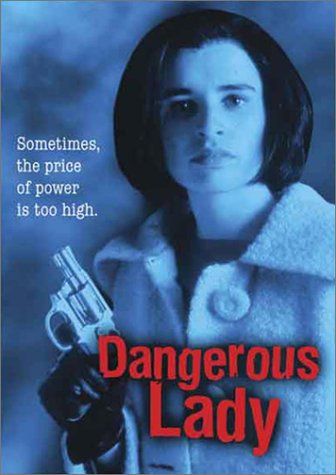 Based on the debut novel by British crime writer Martina Cole, this depicts the life of Maura Ryan (Lynch), the only daughter in her family, whose brothers are making a push for increased power in the underworld of 1960’s London, much to the disapproval of the Ryan’s matriarch (Hancock). Leading the push is Michael (Isaacs), who has more than a touch of Ronnie Kray about him, being both homosexual and a borderline psychotic. Maura falls in love with Terry Patterson (Teale), and is shocked to discover he’s a policeman. When he comes under pressure from colleagues to use their relationship, he ends it – unaware that Maura has just become pregnant. She is forced to have an abortion, which leaves her insides looking like they’ve been weed-whacked, and vows she’s going to show him, by becoming every bit the gangster peer of her brothers. But the path to the top is littered with dead bodies, of foes, friends and family.
Based on the debut novel by British crime writer Martina Cole, this depicts the life of Maura Ryan (Lynch), the only daughter in her family, whose brothers are making a push for increased power in the underworld of 1960’s London, much to the disapproval of the Ryan’s matriarch (Hancock). Leading the push is Michael (Isaacs), who has more than a touch of Ronnie Kray about him, being both homosexual and a borderline psychotic. Maura falls in love with Terry Patterson (Teale), and is shocked to discover he’s a policeman. When he comes under pressure from colleagues to use their relationship, he ends it – unaware that Maura has just become pregnant. She is forced to have an abortion, which leaves her insides looking like they’ve been weed-whacked, and vows she’s going to show him, by becoming every bit the gangster peer of her brothers. But the path to the top is littered with dead bodies, of foes, friends and family. Confusingly titled in the West, without any indication it wasn’t the first of the rebooted franchise, this perhaps explains why there’s little or no explanation of… Well, anything, really. What is Section Zero? Who is Rei? Where did she come from? “Never mind about that,” seems to be the film’s attitude, “Here are Natsuki Ozawa’s breasts to distract you from such trifles.” That’s particularly the case early on, when it seems Rei is unable to go five minutes without showing them off, whether it’s through being molested, becoming inescapably randy or simply taking a soapy shower (to wash off the blood after a kill, so I guess it’s a shower necessary to the plot – it also replays the intruder shower scene from its predecessor, with a different ending).
Confusingly titled in the West, without any indication it wasn’t the first of the rebooted franchise, this perhaps explains why there’s little or no explanation of… Well, anything, really. What is Section Zero? Who is Rei? Where did she come from? “Never mind about that,” seems to be the film’s attitude, “Here are Natsuki Ozawa’s breasts to distract you from such trifles.” That’s particularly the case early on, when it seems Rei is unable to go five minutes without showing them off, whether it’s through being molested, becoming inescapably randy or simply taking a soapy shower (to wash off the blood after a kill, so I guess it’s a shower necessary to the plot – it also replays the intruder shower scene from its predecessor, with a different ending). Probably the least accurate title of any film ever – at least Friday the 13th put out a few movies before using “final” – you definitely should begin here if you’re looking for much coherence. Rei (Iijima) is now partly employed as secretary to the head of Section Zero, but also takes out criminals for whom traditional channels of law enforcement aren’t enough, for one reason or another. She also pals around with Takako (Fukuoka), a detective from another section and a girl he helped bring out of delinquency, in what’s vaguely intimated as a love triangle. One night, they witness a hit and run, and discover the perpetrator (Suzuki) is the daughter of a powerful economic figure. Despite encountering official resistance, Rei and Takako persist with their investigation and, inevitably, this brings out more robust sanctions.
Probably the least accurate title of any film ever – at least Friday the 13th put out a few movies before using “final” – you definitely should begin here if you’re looking for much coherence. Rei (Iijima) is now partly employed as secretary to the head of Section Zero, but also takes out criminals for whom traditional channels of law enforcement aren’t enough, for one reason or another. She also pals around with Takako (Fukuoka), a detective from another section and a girl he helped bring out of delinquency, in what’s vaguely intimated as a love triangle. One night, they witness a hit and run, and discover the perpetrator (Suzuki) is the daughter of a powerful economic figure. Despite encountering official resistance, Rei and Takako persist with their investigation and, inevitably, this brings out more robust sanctions.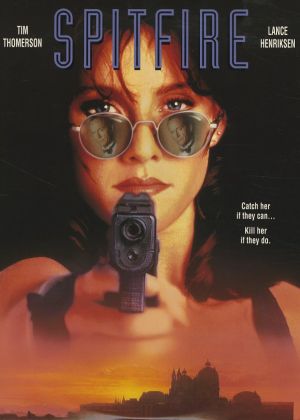 This can only be described as a mess, albeit a crappily entertaining one, with a leading lady in Phillips, who almost made it to the Olympics, being described as “the next Mary-Lou (Retton)”, before trying her hand in low-budget action. She plays an international-level gymnast and martial-arts expert, whose parents are, unknown to her, involved in a plot involving the launch codes for Ukrainian missiles. The mother is killed by villainous Brit, Carla Davis (Douglas – apparently Jenny Agutter was unavailable. Or, more likely, too expensive), who wants to get her claws on the codes for some reason. Hey, she’s a villain: what more does she need? She captures Dad (Henriksen), but not before he has given his daugher the first in a series of clues which will lead her and investigative journalist Rex Beechum (Thomerson), apparently with an unlimited expense account, around the globe from Rome to Kuala Lumpur to Hong Kong and Athens, bumping into various unexpected siblings along the way.
This can only be described as a mess, albeit a crappily entertaining one, with a leading lady in Phillips, who almost made it to the Olympics, being described as “the next Mary-Lou (Retton)”, before trying her hand in low-budget action. She plays an international-level gymnast and martial-arts expert, whose parents are, unknown to her, involved in a plot involving the launch codes for Ukrainian missiles. The mother is killed by villainous Brit, Carla Davis (Douglas – apparently Jenny Agutter was unavailable. Or, more likely, too expensive), who wants to get her claws on the codes for some reason. Hey, she’s a villain: what more does she need? She captures Dad (Henriksen), but not before he has given his daugher the first in a series of clues which will lead her and investigative journalist Rex Beechum (Thomerson), apparently with an unlimited expense account, around the globe from Rome to Kuala Lumpur to Hong Kong and Athens, bumping into various unexpected siblings along the way.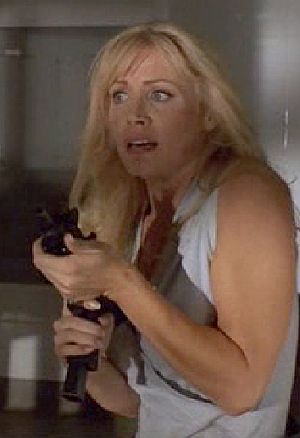 An almost-entirely shameless Die Hard rip-off, this stars Tweed as Shannon Bell, the host of a beauty-pageant, which is interrupted by Oz (Clay) and his gang, who take a half-dozen of the beauty-queens and Bell hostage, up in the penthouse, and demand $10 million in diamonds for their release. Bell manages to slip away and, fortunately, her character is an actress, famous for playing action heroines [yeah, it’s all a bit ‘meta’ – except, it came out in 1992, largely before ‘meta’ became popular…]. So she gets to go all John McClane on their asses, crawling round air-ducts and assisting ex-federal agent Crane (Davi), who was bodyguarding one of the participants, who is a politician’s daughter, but popped outside the building for a fortunately-timed smoke.
An almost-entirely shameless Die Hard rip-off, this stars Tweed as Shannon Bell, the host of a beauty-pageant, which is interrupted by Oz (Clay) and his gang, who take a half-dozen of the beauty-queens and Bell hostage, up in the penthouse, and demand $10 million in diamonds for their release. Bell manages to slip away and, fortunately, her character is an actress, famous for playing action heroines [yeah, it’s all a bit ‘meta’ – except, it came out in 1992, largely before ‘meta’ became popular…]. So she gets to go all John McClane on their asses, crawling round air-ducts and assisting ex-federal agent Crane (Davi), who was bodyguarding one of the participants, who is a politician’s daughter, but popped outside the building for a fortunately-timed smoke.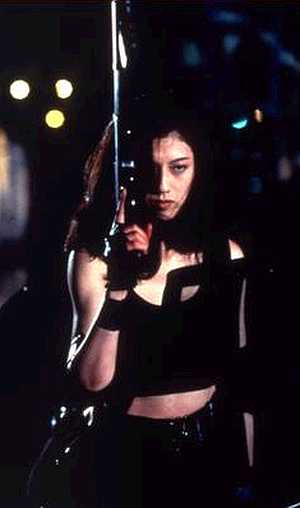 Debate raged over this one. Chris reckons lead actress Shimamura was, at some point, a man. I’m not quite so convinced, but the mere thought certainly gave the sex scenes here an added edge of creepiness. Given the lengthy such sequence which occurs about five minutes in, I feared this was going to be no more than an itty-bitty titty-fest. Fortunately, after getting that out of his system, director Ikeda (Evil Dead Trap) settles down and delivers a gritty bit of nastiness, occasionally teetering on the edge of sadistic.
Debate raged over this one. Chris reckons lead actress Shimamura was, at some point, a man. I’m not quite so convinced, but the mere thought certainly gave the sex scenes here an added edge of creepiness. Given the lengthy such sequence which occurs about five minutes in, I feared this was going to be no more than an itty-bitty titty-fest. Fortunately, after getting that out of his system, director Ikeda (Evil Dead Trap) settles down and delivers a gritty bit of nastiness, occasionally teetering on the edge of sadistic.